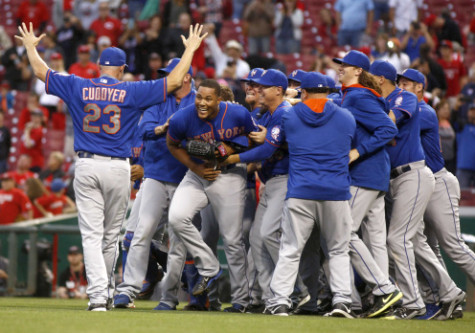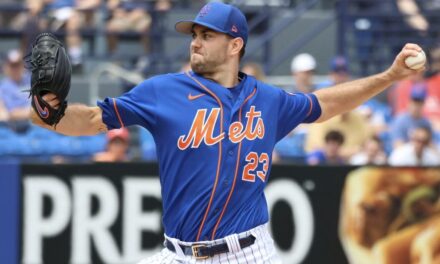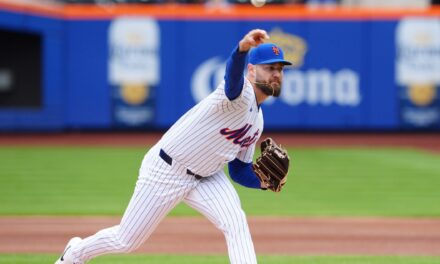
There are no guarantees in baseball, no sure things. Of the eight teams left in the playoffs after tonight, there’s no telling who might win it. While it’s true that someone has to take the title, betting on baseball’s post-season results is a blind shot in the dark no matter how much you think you know. Chris Moore from the sadly defunct Baseball Analysts breaks it down nicely.
Vegas will eventually roll you in a back alley and take your wallet leaving you with some loose teeth and a really bad hangover. The Mets probably aren’t the best team in the playoffs — that honor might be bestowed on the Cardinals or really any of the NL Central teams — but it doesn’t mean the Mets can’t win it all. It’s just that who is “better” doesn’t make nearly as much of a difference as you think. Randomness rules when it comes to MLB’s playoffs… it just does.
It’s like trying to predict when and where your car will get splattered with bird droppings. Sure you could track migratory patterns and feeding cycles and study pigeon congregations and such, but that won’t stop a wayward gull from leaving a nice bit of artwork on your just washed and waxed baby. Baseball is probably even more random than bird droppings. It’s like trying to predict a drunk’s footsteps. Here is a quote from a wonderful book by Leonard Mlodinow called The Drunkard’s Walk: How Randomness Rules Our Lives.
“If one team is good enough to warrant beating another in 55% of its games, the weaker team will nevertheless win a seven-game series about four times out of 10. And if the superior team could beat its opponent, on average, two out of three times they meet, the inferior team will still win a seven-game series about once every five match-ups. There is really no way for a sports league to change this.”
“In the lopsided 2/3 probability case, for example, you’d have to play a series consisting of at minimum the best of 23 games to determine the winner with what is called statistical significance, meaning the weaker team would be crowned champion 5 percent or less of the time. And in the case of one team’s having only a 55-45 edge, the shortest significant “world series” would be the best of 269 games, a tedious endeavor indeed!”
“So sports playoff series can be fun and exciting, but being crowned world champion is not a reliable indication that a team is actually the best one.”
This explains a lot. In baseball you have an initial set of variables — namely a team’s composite statistical projections based on the aggregate contributions of said team’s member players. So in this sense, baseball is deterministic – your roster on opening day should more or less determine how your team will perform over the course of the season – a talented team should win more.
However, according to the above, a team who is 10 games (or less) better than another team (55-45 in the win column), would have to play a 269 game series in order to determine with certainty who is better. Now to be clear,162 games is still a lot, and as you go beyond that 10 game advantage the better team does in fact become better, but not by as much as you might think.
Life itself is a fairly random occurrence. They say that the odds of a DNA molecule spontaneously forming on it’s own are so astronomically unlikely, chances of it happening by chance, even when you have the right ingredients in some sort of primordial soup, are effectively nil. This sprouts some very entertaining analogies: the monkeys with typewriters theorem stipulates that no matter how many monkeys with typewriters you sit down in a room you aren’t going to get a word for word Hamlet manuscript, just as a tornado passing through a junkyard isn’t going to leave a ready to fly Boeing 747 in its wake (even though all the constituent elements might be present).
As DNA based lifeforms you never can predict what ballplayers will do either. Pat Borders could hit .450 and Brian Doyle could hit .478 in the fall classic, Don Larson could pitch a perfect game, and Al Weis could tie a deciding game 5 with a home run … What are the odds? Not much better than a monkey typing Hamlet I’d wager. And therein lies the remarkable beauty of the game, brought out in the very randomness that makes it so unpredictable — at any time, on any play, something could happen that has never happened before.
Good teams should win more games than poor teams, but over a 7 game series that doesn’t always happen. In a 7 game series, the weaker team will still beat the stronger team 4 out of ten times if there is less than a 10 game difference in their regular season records. Even a team with a 2/3 advantage (a team who has historically beaten another team 2 out of 3 meetings) would have to play a 23 game series to determine with certainty who is better. Now this doesn’t mean that the “better” team doesn’t stand a better chance of winning, It’s always preferable to be on the winning end, but the margin of difference is small, and in a short series — 7 games is short (compared to 23 or 269) by comparison and 5 games is a random blip in a windstorm –anything can happen and it very often does. Since 1998, 5 wild card teams have won the World Series, including two in the last 5 years.
In spite of the fact that baseball is roughly deterministic in a broad (162 game) sense, its playoff structure is not, it is highly randomized within the select upper echelon teams that make it into the tournament. So, initial conditions notwithstanding, outcomes diverge widely in MLB’s post-season if you look at it as a dynamic system. This renders prediction impracticable, and, it is, incidentally, the definition of chaos theory — marginal differences in initial conditions that yield widely unpredictable outcomes (sometimes called the butterfly effect).
When Bryce Harper asked for his ring in spring training it reminded me of LeBron James in 2010 openly wondering how many titles the Heat would win (5? 6? 7?) after adding LeBron and Chris Bosh to Dwayne Wade. As Mets fans we all remember the debacle of 1992 – not to mention 2006. In recent years more dollars have not translated into more wins with any reliability.
Over 162 games you can make reasonable predictions based on talent and prior performance (the Mets did finally meet Sandy Alderson’s 90 win projection) but in 5 or 7 games? Not so much … especially if two teams are separated by less than 10 games.
Mathematically speaking, the best (and perhaps only) thing a General Manager can do is get his team into the playoffs … from there, it’s anyone’s guess. If you make enough appearances you should win one at some point, but there are no guarantees. The Braves were in the post season a solid decade and came away with one World Title.
I do believe these Mets are dangerous. Their big three starters give them as good a shot as anyone because power pitching does seem to matter more in the post-season. On any given day any one of our starters can strangle an opposing lineup like a Roman concubine … But as much as I might be tempted to bet my kids’ college fund on the 2015 Mets, MLB’s playoffs remain remarkably difficult to predict.















